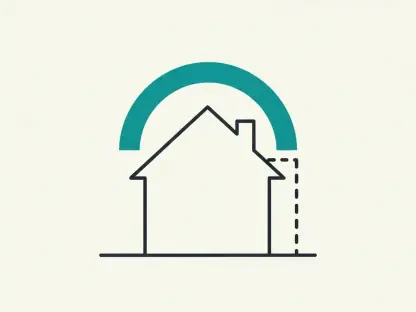The impact of weather-related incidents on property insurance has grown significantly, with natural disasters like wildfires and severe storms posing substantial threats to insurers. To combat these challenges, the collaboration between Cytora, a digital risk processing platform, and Vāyuh, an AI-powered weather analytics company, offers a promising solution. By integrating Vāyuh’s advanced climate and weather data models into Cytora’s platform, this partnership aims to provide underwriters with critical analytics and risk scores, facilitating a more accurate assessment of climate and weather-related risks. This enhancement marks a significant step forward in the pursuit of reliable, data-driven property insurance underwriting.
The Role of AI in Risk Assessment
Vāyuh specializes in AI applications that evaluate property-level risk exposure by incorporating numerous factors that affect a property’s value and vulnerability to natural hazards. Their sophisticated models leverage data from thousands of sources and combine physics with generative AI to create highly accurate forecasts and risk analyses. These analyses cover various weather-related risks, including temperature fluctuations, wildfire potential, precipitation levels, wind speeds, and severe convective storm risks. The integration of this detailed data into Cytora’s platform allows underwriters to automate risk enrichment, significantly reducing the need for manual processing and enhancing decision-making accuracy. This, in turn, can lead to improved underwriting efficiency, more precise risk selection, and potentially increased profitability for insurers.
The ability to utilize AI-generated insights enables insurers to stay ahead of emerging risks posed by climate change. As traditional methods of risk assessment become increasingly inadequate, the use of advanced analytics becomes crucial for maintaining the stability and sustainability of the insurance industry. AI brings a new level of precision to underwriting processes by constantly updating and refining risk models based on real-time data. This innovative approach ensures that insurers can make well-informed decisions, thereby minimizing losses from natural catastrophes and protecting their portfolios from unforeseen events.
Benefits of AI-Powered Weather Analytics
The collaboration between Cytora and Vāyuh underscores the importance of leveraging cutting-edge technology to tackle the evolving landscape of natural disaster risks. Automated risk enrichment provided by Vāyuh’s models offers numerous benefits to property insurers. By streamlining the collection and analysis of vast amounts of data, underwriters can focus more on strategic decision-making rather than getting bogged down in manual processing tasks. This shift not only improves the accuracy of risk assessments but also enhances overall efficiency, allowing for quicker responses to policy applications and claims.
Moreover, the precision of Vāyuh’s AI-powered analytics translates to more effective risk mitigation strategies. Insurers can proactively identify properties at higher risk of weather-related damage and implement measures to minimize potential losses. This proactive stance is invaluable in an era marked by increasing frequencies of extreme weather events. The ability to anticipate and prepare for such occurrences can significantly reduce financial strain on insurers and provide better protection for policyholders. Additionally, improved risk assessments can lead to fairer premium pricing, ensuring that policyholders are neither overcharged nor underinsured.
Expanding the Insurance Data Ecosystem
Earlier in the year, Cytora expanded its data ecosystem by partnering with Smarty, a property data solutions company. This collaboration embedded robust US property data into Cytora’s platform, enhancing property risk evaluation for insurers with attributes such as geospatial accuracy, building footprint details, and address verification. By continuously integrating new data sources, Cytora aims to create a comprehensive and dynamic insurance data ecosystem that supports more refined risk modeling and better decision-making.
The partnership with Vāyuh builds on this strategy by adding a critical layer of weather and climate analytics. With these tools, underwriters have access to a more holistic view of property risks, allowing them to make more informed decisions based on a combination of static property data and dynamic weather forecasts. This integrated approach significantly enhances the ability of insurers to navigate the complexities of modern risk landscapes.
As the insurance industry faces increasing pressures from climate change, collaborations like that of Cytora and Vāyuh highlight the necessity of adopting innovative solutions. The synergy between digital platforms and AI-powered analytics plays a pivotal role in transforming how insurers assess and manage risks, ensuring resilience and adaptability in an ever-changing environment.
Future Considerations
The impact of weather-related incidents on property insurance has dramatically increased, with natural disasters such as wildfires and severe storms posing significant risks to insurers. Addressing these challenges, a collaboration between Cytora, a digital risk processing platform, and Vāyuh, an AI-based weather analytics firm, has emerged as a promising solution. This partnership aims to integrate Vāyuh’s sophisticated climate and weather data models into Cytora’s system. By doing so, underwriters will gain access to critical analytics and risk scores, facilitating a more precise evaluation of climate and weather-related threats. This significant enhancement represents a major advancement in ensuring robust, data-driven property insurance underwriting. Moreover, it highlights the importance of leveraging technology and data analytics in creating more resilient and responsive insurance assessments, ultimately leading to better risk management and pricing strategies for insurers tackling the growing impact of natural disasters on property insurance.









